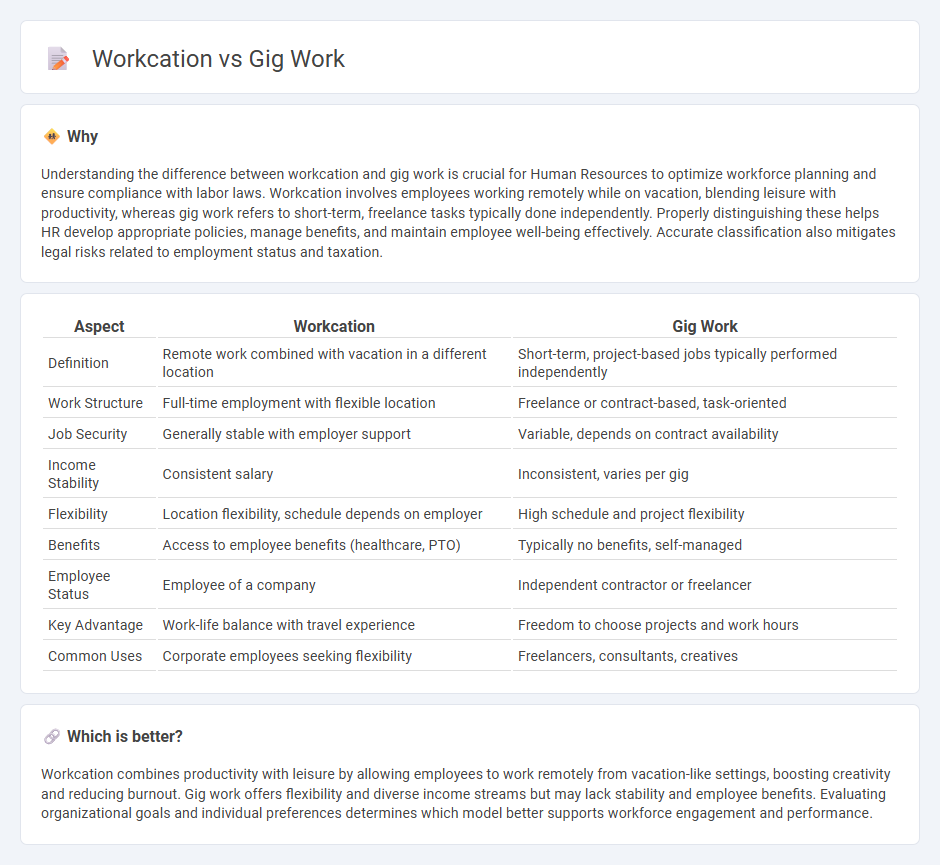
Workcation combines remote work with travel, allowing employees to maintain productivity while exploring new environments, promoting work-life balance and employee satisfaction. Gig work offers flexible, project-based employment that enables individuals to choose tasks and work hours, catering to the growing demand for autonomy and diverse income sources. Explore the differences and benefits of workcation and gig work to optimize your career strategy.
Why it is important
Understanding the difference between workcation and gig work is crucial for Human Resources to optimize workforce planning and ensure compliance with labor laws. Workcation involves employees working remotely while on vacation, blending leisure with productivity, whereas gig work refers to short-term, freelance tasks typically done independently. Properly distinguishing these helps HR develop appropriate policies, manage benefits, and maintain employee well-being effectively. Accurate classification also mitigates legal risks related to employment status and taxation.
Comparison Table
| Aspect | Workcation | Gig Work |
|---|---|---|
| Definition | Remote work combined with vacation in a different location | Short-term, project-based jobs typically performed independently |
| Work Structure | Full-time employment with flexible location | Freelance or contract-based, task-oriented |
| Job Security | Generally stable with employer support | Variable, depends on contract availability |
| Income Stability | Consistent salary | Inconsistent, varies per gig |
| Flexibility | Location flexibility, schedule depends on employer | High schedule and project flexibility |
| Benefits | Access to employee benefits (healthcare, PTO) | Typically no benefits, self-managed |
| Employee Status | Employee of a company | Independent contractor or freelancer |
| Key Advantage | Work-life balance with travel experience | Freedom to choose projects and work hours |
| Common Uses | Corporate employees seeking flexibility | Freelancers, consultants, creatives |
Which is better?
Workcation combines productivity with leisure by allowing employees to work remotely from vacation-like settings, boosting creativity and reducing burnout. Gig work offers flexibility and diverse income streams but may lack stability and employee benefits. Evaluating organizational goals and individual preferences determines which model better supports workforce engagement and performance.
Connection
Workcation and gig work intersect by offering flexible employment models that cater to the evolving needs of the modern workforce. Human resources departments leverage gig work to access specialized skills on a project basis while enabling employees to engage in workcations, blending travel with productivity. This synergy enhances talent retention and promotes work-life balance by integrating remote gig assignments with location-independent work experiences.
Key Terms
**Gig Work:**
Gig work offers flexible, project-based employment often found in industries such as ride-sharing, freelance design, and delivery services, emphasizing autonomy and variable income. Workers prioritize immediate task completion, leveraging digital platforms to connect with clients or customers on demand without long-term commitments. Explore how gig work can reshape your career flexibility and income potential.
Flexibility
Gig work offers unparalleled flexibility by allowing workers to choose projects and set their own schedules, adapting to personal preferences or peak productivity times. Workcations provide flexibility by combining remote work with travel opportunities, enabling professionals to maintain job responsibilities while exploring new environments. Discover how these flexible work models can transform your work-life balance and productivity.
Independent Contractor
Independent contractors engaging in gig work pursue flexible, task-based jobs without a long-term commitment to a single employer, often leveraging platforms like Uber, Fiverr, or Upwork. Workcation offers contractors the opportunity to blend remote work with travel, enhancing work-life balance by operating from diverse locations while maintaining project deadlines. Explore the benefits and challenges of combining gig work with workcations to optimize independent contractor productivity and lifestyle.
Source and External Links
GigSmart - Allows users to find local, flexible gig work opportunities and apply for jobs quickly through their platform.
Gig Economy Data Hub - Defines gig work as income-generating activities outside traditional employment.
AnyShift - Offers a gig app that facilitates fast and affordable hiring for businesses in San Antonio.
 dowidth.com
dowidth.com